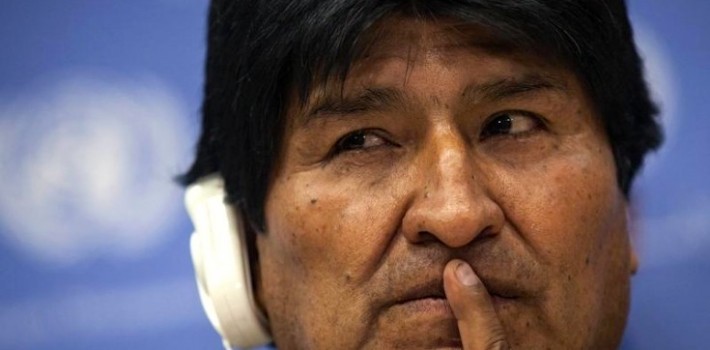
EspañolBy Luis Sergio Calbimonte
Evo Morales has been president of Bolivia since 2006. During his first term (2006-2009), Morales summoned a constituent assembly, which was approved via referendum in 2009. When the assembly was installed, congressmen began to draft a new constitution which they promised would take into account Bolivia’s diversity.
It the end, however, this new constitution only included the political agenda of the ruling party, Movimiento al Socialismo (Movement Towards Socialism). While the constituent assembly was in session, Morales’s socialists committed a political carnage that left many dead. Others became political prisoners and exiles. The new Bolivian state arose amid harassment, which continues to this day. Nonetheless, the opposition managed to limit the president’s reelection to a single term in the new constitution.
In December 2009, new national elections were held as the constitution required. Morales won, so he began his second term by getting rid of all checks and balances while imposing state control over the vast majority of media outlets. Morales also gave himself a free pass to blackmail the private sector and curtail the opposition, which still controlled some local governments, as much as possible.
These were five years in which the ruling party squandered as much money as it could while the price of hydrocarbons, minerals, and agricultural products remained high. That money was also used to buy the voters’ allegiance.
In 2014, Morales sought reelection once again although, according to the new constitution, the president would not be allowed to serve a third term since his time in office before the constitution’s creation would be taken into account. Nonetheless, the Constitutional Tribunal, co-opted by the government, claimed that the new constitution had “refounded” the Bolivian nation state. This allowed the socialists to launch their candidate once again and secure a third term for Morales.
[adrotate group=”8″]
As the global commodities prices plunge, however, the populist feast is coming to an end, both in Bolivia and throughout Latin America. This is why Morales’s government hastily convened a constitutional referendum hoping to gain popular support for yet another reelection.
If Bolivians vote “Yes” to amend the constitution, Morales could run again in 2019 for what would be his fourth administration, which would last until 2025.
At the campaign’s outset, the ruling socialist party was the clear favorite since it counted with a grotesque amount of public funds. Over the last few months, however, citizens’ resistance to Morales and his party has reached unprecedented levels.
Unexpectedly, ordinary citizens have displaced the political class as the campaign’s protagonists. Bolivians have organized themselves in different citizen platforms in order to campaign for “No” to Morales’s reelection across the country. They have raised the flag of democracy and freedom by resisting the president’s attempts to do away with yet another limit to the state’s power.
Since the “No” campaign is a grassroots effort, the message has spread quickly and with few resources. In fact, the anti-reelection campaign has hardly any resources, but it has successfully presented the “Yes” campaign as lackeys for one ideology, one political party, and one single person — Morales.
On the other hand, the “No” option is clearly refreshing and young. It has no single face, but it does have many ideas in favor of political liberty and freedom of expression.
Because this is a citizen campaign, social networks became a mobilizing tool.
The No campaign has also made efficient use of social media for the first time in Bolivia’s electoral history. Since the government controls the greater part of the traditional media, Facebook, Twitter, and the like offer a haven free of censorship.
Three weeks before the referendum, the polls showed a tie between the Yes and No campaigns, each having around 40 percent of the vote. The 20 percent of voters who remain undecided until nearly the end will define the outcome. In other words, ordinary citizens have an opportunity to challenge the powerful.
The No campaign headed into the election itself with momentum since the government has been recently accused of influence peddling and corruption. Morales himself is directly tied to the scandals.
It remains to be seen whether a No campaign’s victory is actually declared, or whether the institution in charge of administering and overseeing Bolivia’s elections resorts to fraud in order to please the government.
Bolivians hoping to keep Morales out of indefinite power, however, are inspired by the recent success of the opposition in Venezuela’s elections. If the No campaign wins, it will be thanks to the brave citizens who decided to take on the political class. Hope, it seems, is also coming to Bolivia.
Luis Sergio Calbimonte is a Law student at the Private University of Santa Cruz de la Sierra, Bolivia. Calbimonte is also an Executive Board Member of Estudiantes por la Libertad, and former president of Casa de la Juventud. Follow him @LuisSergioCB.
 Versión Español
Versión Español












